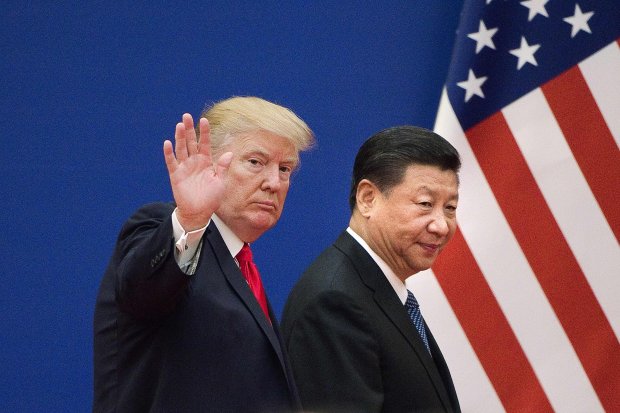
The Wall Street Journal states that the most important international problem confronting the Trump administration isn't in North Korea or Iran. Instead, it lies in the rapidly multiplying challenges posed by China...Events of recent days have underscored that a global tug of war between the U.S. and China is now fully on. Indeed, it has become the dominant feature on the global landscape, and figures to stay that way for a long while..The newest challenges from China are military ones. The Pentagon last week disinvited China from participating in a set of military exercises in the Pacific to protest the way the Chinese have broken their promise not to militarize the disputed Spratley Islands. Those islands lie some 500 miles away from the Chinese mainland, nicely illustrating how China is extending its reach...Other challenges are diplomatic. It appears China was at least partly responsible for the more belligerent tone North Korea struck last week in the run-up to a planned summit meeting between North Korean leader Kim Jong Un and President Donald Trump. North Korea's attitude became noticeably more blustery after Mr. Kim met with Chinese President Xi Jinping. It's a reasonable guess that the Chinese leader warned his young and highly dependent North Korean counterpart against moving too far or too fast in deal-making with the U.S...Many China-related challenges are economic. In the wake of Mr. Trump's decision to abandon the nuclear deal with Iran, the Chinese are maneuvering to take advantage of business opportunities that now may arise as the Trump administration pressures European firms to back away from Iran or face new economic sanctions imposed by the U.S.
Reuters reports that Chinese and U.S. envoys sparred at the World Trade Organization on Monday over U.S. President Donald Trump's claims that China steals American ideas, the subject of two lawsuits and a White House plan to slap huge punitive tariffs on Chinese goods. U.S. Ambassador Dennis Shea said "forced technology transfer" was often an unwritten rule for companies trying to access China's burgeoning marketplace, especially if they were partnering with a state-owned or state-directed Chinese firm. China's licensing and administrative rules forced foreign firms to share technology if they wanted to do business, while government officials could exploit vague investment rules to impose technology transfer requirements, he said. "This is not the rule of law. In fact, it is China's laws themselves that enable this coercion," Shea told the WTO's dispute settlement body, according to a copy of his remarks provided to Reuters. "Fundamentally, China has made the decision to engage in a systematic, state-directed, and non-market pursuit of other (WTO) members' cutting-edge technology in service of China's industrial policy."...China flatly rejected the criticism, which has spawned WTO disputes from both sides and a $50 billion tariff threat from Trump. "There is no forced technology transfer in China," China's Ambassador Zhang Xiangchen told the meeting, adding that the U.S. argument involved a "presumption of guilt".
- 2018-05-27 US presses China to sign long-term import contracts
- 2018-05-25 Trump Levies Would Hit Other Asia Economies Harder Than China's
- 2018-05-24 The Trump presidency is a win for China
- 2018-05-23 Trump Blames China’s Xi Jinping for Sabotaging the Kim Jong Un Summit
- 2018-05-22 There's no deal with China on ZTE, and I'm not satisfied with trade talks
- 2018-05-21 Be careful if China cuts you a check, says former US trade official
- 2018-05-20 US detente with China postpones trade war but angers hardliners
- 2018-05-18 Did China Just Bribe Trump to Undermine National Security?
- 2018-05-17 Trump: I 'doubt' China trade negotiations will succeed
- 2018-05-16 Just about everything is odd about Trump’s support of Chinese firm ZTE
- Forbes Ant Financial Said To Close $150 B Funding Round
- Reuters Alibaba injects pharmacy assets into healthcare unit in $1.4 billion deal
- Financial Times N Korea continues to find foreign currency despite sanctions
- Financial Times 'National team' sells $28bn of vast China stock holdings in Q1
- Bloomberg China's $10 Trillion Shadow Bank Crackdown Has a Long Way to Go
- Financial Times Chinese box office takings look to beat US for first time
- AXIOS.com South Korea keeps door open to more talks with North Korea
- The Hill China pushing new generation of nuclear weapons: report
- www.huffingtonpost.com Flight Instructor Tried To Deport Foreign Student 'Back To China': Cops
- The Guardian 'Digital wallet' of Ant Financial captivates China and beyond
- Reuters UPDATE 1-BRICS development bank to issue $780 million in yuan-denominated bonds
- The Washington Post Philippines says it told China of 'red lines' in sea feud
- New York Times Trump's Manchurian Trade Policy
- Financial Times Donald Trump strains the art of the deal
